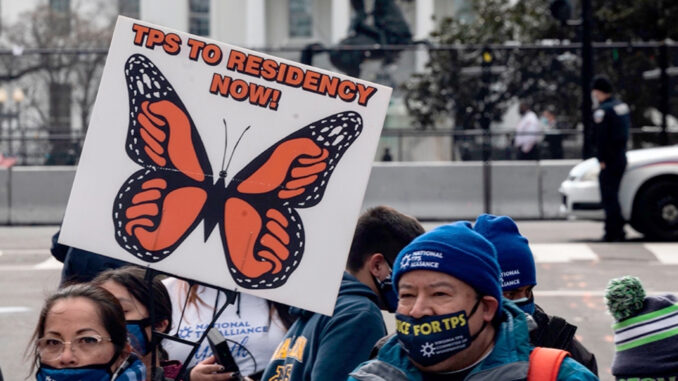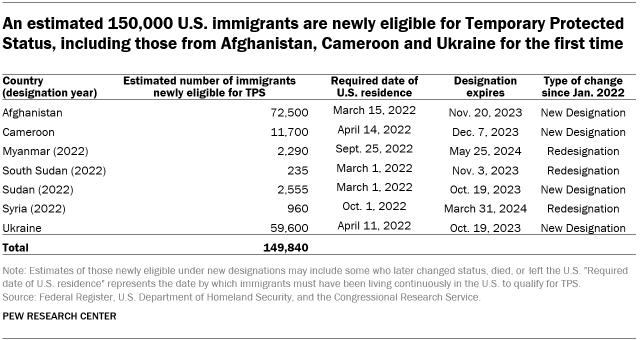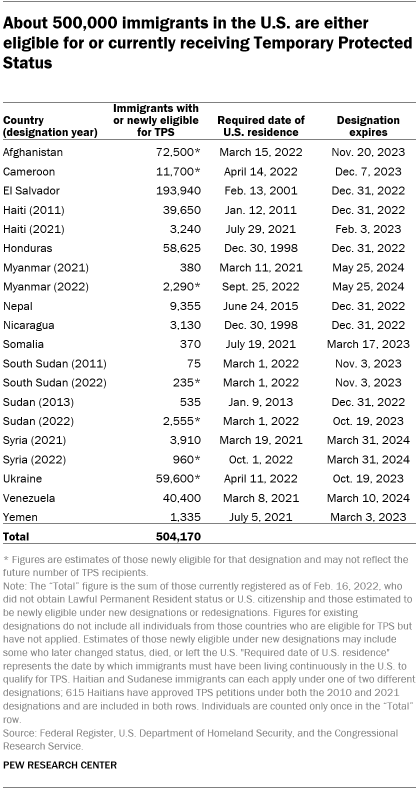
The Biden administration has further expanded the Temporary Protected Status (TPS) program by giving an estimated 143,800 immigrants from Afghanistan, Cameroon and Ukraine the opportunity to apply for time-limited permission to live and work in the United States and avoid potential deportation. The U.S. Department of Homeland Security (DHS), which oversees the program, also recently extended, designated or redesignated TPS protections for eligible immigrants from Myanmar (also called Burma), South Sudan, Sudan, Syria and Venezuela.
TPS offers temporary protection from deportation for qualifying immigrants who are living in the U.S. and who come from designated nations deemed unsafe to return to because of war, hurricanes, earthquakes, or other potentially hazardous conditions. Federal immigration officials may grant TPS status to immigrants for up to 18 months based on conditions in their home countries and may repeatedly extend eligibility if dangerous conditions persist. These most recent updates extend protections for all affected TPS recipients until at least October 2023.
The recent expansions to TPS continue the administration’s broadening of protections since 2021. Earlier in President Joe Biden’s term, DHS added Myanmar and Venezuela to the list of countries whose immigrants may qualify, while extending the terms of eligibility for immigrants from most countries that were already covered by TPS. These expansions stand in contrast to the Trump administration’s efforts to end TPS for nearly all beneficiaries, which were blocked by a series of lawsuits.

How we did this
Following the Biden administration’s most recent additions and extensions, an estimated 500,000 individuals from 15 countries are either currently registered for TPS or are newly eligible for it. The list of countries with active TPS designations now includes Afghanistan, Cameroon, El Salvador, Haiti, Honduras, Myanmar, Nepal, Nicaragua, Syria, Somalia, South Sudan, Sudan, Ukraine, Venezuela and Yemen.

The current estimate of those receiving TPS or eligible for it is far lower than the government’s previous estimate from late 2021. That is because the number of people from Haiti, Myanmar and Venezuela who ultimately received TPS protections under 2021 designations is much lower than the the number originally projected to be eligible. Just 44,020 immigrants from those three nations had been granted protections under the program as of Feb. 16, 2022, compared with the nearly 425,000 originally projected to be eligible. Some immigrants who might have been eligible could instead have obtained a different immigration status, died, left the U.S., or applied but were not yet granted protection.
On his first day as president, Biden asked Congress to pass legislation – which has since been introduced in the House – that would allow TPS recipients who meet certain conditions to apply immediately for green cards that would let them become lawful permanent residents. Green card holders may be granted U.S. citizenship if they pass additional background checks and meet the usual naturalization conditions of knowledge of English and U.S. civics. TPS recipients are not currently eligible for permanent residency or U.S. citizenship, unless they pursue those statuses through other immigration processes.
Administration cites dangerous conditions in countries covered by TPS
- Afghanistan: In designating Afghan immigrants as eligible for TPS, the Biden administration wrote that Afghanistan continues to experience “armed conflict and insurgency,” and that the Taliban is unfit “to meet the country’s numerous challenges” related to safety, the national economy, health care, food security and respect for human rights. DHS estimates approximately 72,500 Afghans are eligible to apply for TPS.
- Cameroon: The primary reason for Cameroon’s designation is the extreme violence between government forces and armed separatists, from the terrorist organization Boko Haram, and from other vigilante groups. Civilians have faced human rights abuses by both government and separatist soldiers, as well as the consequences of economic deterioration from violence and the armed forces’ attempts to impose order. Thousands have died and hundreds of thousands more have been displaced. DHS estimates approximately 11,700 people from Cameroon are eligible to file TPS applications.
- Ukraine: The Biden administration designated immigrants from Ukraine as eligible for TPS following Russia’s full-scale invasion in February. In addition to claiming the lives of thousands of Ukrainians and forcing more than 4 million people to flee Ukraine for refuge in neighboring European nations, Russian forces’ ongoing missile strikes have destroyed schools, hospitals and commercial centers. The government estimates some 59,600 immigrants in the U.S. from Ukraine are eligible under this designation.
- Myanmar: The administration also recently extended and redesignated Myanmar’s status as a TPS country following the Feb. 1, 2021, military coup of the country’s democratically-elected government. The newly installed military regime has caused ongoing human rights abuses, internal displacement, destruction of infrastructure and resource insecurity. While about 380 immigrants currently receive TPS under Myanmar’s original designation, DHS has estimated that about 2,290 more would be made newly eligible with Myanmar’s redesignation.
- Sudan: Immigrants from Sudan had the ability to apply for TPS under prior designations. DHS has most recently updated Sudan’s TPS status to reflect ongoing civil unrest and violence across the country, the aftermath of an economic downturn, and struggles with severe flooding. Under the Biden administration, the U.S. Department of Homeland Security has newly designated Sudan, giving its TPS status a later end date of Oct. 19, 2023, paving the way for an estimated 3,090 additional immigrants to apply for relief.
- South Sudan: South Sudan’s TPS designation was extended and redesignated to reflect the country’s longstanding struggles with armed conflict, violence against civilians, and various humanitarian crises involving severe food insecurity, extreme flooding and large-scale civilian displacement. The Congressional Research Service finds there are about 75 South Sudanese TPS recipients. DHS estimates that 235 individuals will become newly eligible for TPS under the redesignation.
- Syria: Syria’s TPS status was also extended and redesignated to reflect the ongoing civil war and the resulting dangerous living conditions. Civilians in Syria have had to flee from their homes amidst destroyed infrastructure, food and water scarcity, and threat of injury or death from violence. The Congressional Research Service estimates there are about 3,910 Syrian TPS recipients who are not citizens or legal permanent residents from the previous designation. The Biden administration has estimated that 960 individuals will become newly eligible for TPS under the redesignation.
- Venezuela: When designating Venezuelans as eligible for TPS in 2021, the Biden administration stated that the nation “is currently facing a severe humanitarian emergency” as the result of an ongoing economic recession and prolonged political crisis, with wide-ranging impacts on its economy, human rights, medical care, crime, and access to food and basic services. On July 11, 2022, Secretary of Homeland Security Alejandro Mayorkas announced that he would extend Venezuela’s TPS designation, but would not redesignate the country, which would update the requirement for eligibility. So while those currently receiving TPS can reapply to have their status extended to the new date specified by the TPS extension – in this case, until March 10, 2024 – the lack of a redesignation prevents any new immigrants from qualifying for TPS. Only about 40,400 of the 323,000 immigrants originally estimated to be eligible for TPS currently hold it, as of Feb. 16, 2022, under Venezuela’s 2021 designation.
Deferred Enforced Departure also offers protection from deportation
Another form of temporary relief from deportation called Deferred Enforced Departure (DED) is granted at the president’s discretion, rather than as a result of an administrative process in the U.S. Department of Homeland Security. It usually follows catastrophes in immigrants’ home countries similar to those that have triggered TPS. Currently, certain immigrants from Liberia and Hong Kong are eligible for this benefit and are also allowed to apply for authorization to work. Liberian immigrants with DED have relief until June 30, 2024. Immigrants from Hong Kong must have lived in the U.S. since Aug. 5, 2021, and have relief until Feb. 5, 2023.
Most TPS recipients have lived in the U.S. for decades
Immigrants with TPS live in all 50 states, the District of Columbia and U.S. territories, according to the Congressional Research Service. The largest populations live in Florida, California, Texas and New York, which have traditionally had large immigrant populations.
Once DHS designates a nation’s immigrants as eligible for TPS, those immigrants can apply for the deportation relief if they entered the U.S. without authorization or entered on a temporary visa that has since expired. Those with a valid temporary visa or another non-immigrant status, such as foreign students, are also eligible to apply.
Most current TPS beneficiaries have lived in the U.S. for two decades or more. For example, those from Honduras and Nicaragua were designated eligible based on damage from Hurricane Mitch in 1998 and must have been living in the country since Dec. 30 of that year. The current protection for immigrants from El Salvador applies to those who have lived in the U.S. since Feb. 13, 2001, following a series of earthquakes that killed more than a thousand people and inflicted widespread damage.
To be granted TPS, applicants must meet filing deadlines, pay a fee, and prove they have lived in the U.S. continuously since the events that triggered relief from deportation. They must also meet criminal record requirements – for example, that they have not been convicted of any felony or two or more misdemeanors while in the U.S., have persecuted others or have engaged in terrorism.
Federal officials are required to announce 60 days before any TPS designation expires whether it will be extended. Without a decision, it automatically extends six months.
Congress and President George H.W. Bush authorized the TPS program in the 1990 immigration law, granting the White House executive power to designate and extend the status to immigrants in the U.S. based on certain criteria.



Be the first to comment